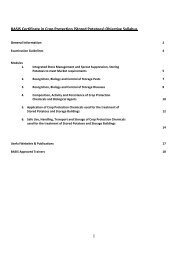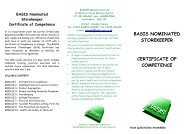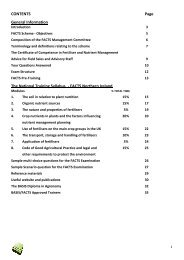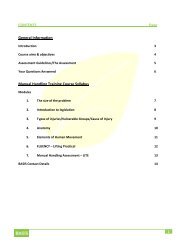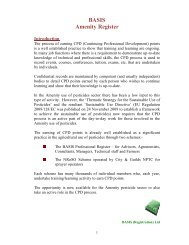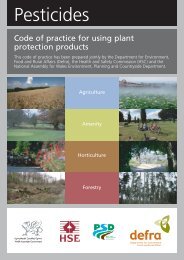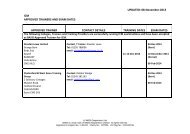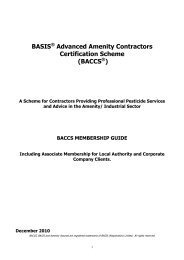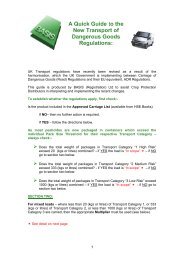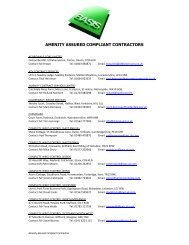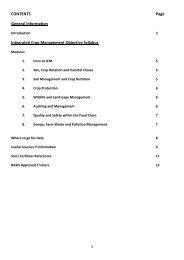(Amenity Horticulture) Syllabus - Basis
(Amenity Horticulture) Syllabus - Basis
(Amenity Horticulture) Syllabus - Basis
Create successful ePaper yourself
Turn your PDF publications into a flip-book with our unique Google optimized e-Paper software.
CONTENTS<br />
Page<br />
General Information<br />
Introduction 3<br />
Content and Duration of the Course 5<br />
Exam Structure 5<br />
Foundation Award (<strong>Amenity</strong> <strong>Horticulture</strong>) <strong>Syllabus</strong><br />
Core Modules<br />
1. Professional Pesticides 6<br />
2. Application of Pesticides 7<br />
3. Protecting people, animals and the environment 8<br />
Hard/Permeable Surfaces – Skill Area<br />
4. Weed Control 9<br />
Turf and Borders<br />
5. Weeds Control 10<br />
6. Disease control 11<br />
7. Pest Control 12<br />
BASIS Approved Trainers 13<br />
1
2<br />
© BASIS (Registration) Ltd<br />
BASIS is a trade mark of BASIS (Registration) Limited. All rights reserved.<br />
Registered in England No.: 1365343 Charity No.: 1077006 VAT Reg No.: 242/5497/56
FOUNDATION AWARD<br />
AMENITY HORTICULTURE<br />
Introduction<br />
There are many people working in the <strong>Amenity</strong> <strong>Horticulture</strong> sectors of industry. It is recognised as a very<br />
broad area of activity with inclusion of many facets applicable to: industrial and construction sites; sports<br />
turf maintenance; shrubs and borders in parks, and many other essential elements which relate to<br />
business and social activity.<br />
All these different areas of <strong>Amenity</strong> <strong>Horticulture</strong>, have an involvement with pesticides to assist in weed<br />
control, to control pests and to control plant diseases.<br />
The sale, storage and use of professional pesticides is tightly controlled and those selling / advising,<br />
applying or storing professional pesticides are all required by law to hold the relevant certificates of<br />
competence. In the case of sales / advice, the relevant qualification is the BASIS Certificate for Field, Sales<br />
and Technical Staff (FSTS) in <strong>Amenity</strong> <strong>Horticulture</strong>.<br />
A large number of people in <strong>Amenity</strong> <strong>Horticulture</strong> have a need to understand more about pesticides, how<br />
they work and why they are needed. However their main employment activity may not involve selling,<br />
advising, applying or storing pesticides.<br />
This course is designed for such people and it may also be an introduction for those who wish to go<br />
forward to the next level of qualification (FSTS).<br />
The Foundation Award in <strong>Amenity</strong> covers all three components:<br />
• Hard Surfaces<br />
• Turf<br />
• Shrubs & Borders<br />
The course includes a short examination at the end of 3 days tuition. Those candidates who achieve the<br />
pass level will receive written recognition from BASIS of their achievement but this course does not result<br />
in a BASIS certificate of competence. This is to avoid any confusion with the Statutory qualification (full<br />
BASIS FSTS course).<br />
3
Those to whom the course is suited<br />
• New entrants to the <strong>Amenity</strong> <strong>Horticulture</strong> sector whose job requires an understanding of<br />
professional pesticides.<br />
• Candidates who wish to attain full FSTS qualification and need this course as a “stepping<br />
stone” towards it.<br />
• Those who work in <strong>Amenity</strong> <strong>Horticulture</strong> with a job content requiring knowledge of<br />
professional pesticides, but who do not themselves sell, advise, supply or store them.<br />
Whistle Blowing Policy<br />
BASIS (Registration) Ltd is committed to the highest standards of openness and accountability. Therefore,<br />
we expect employees, candidates and others who work with BASIS who have serious concerns about any<br />
aspect of our work voice those concerns.<br />
To this effect BASIS has a whistle Blowing Policy. This procedure is designed to allow concerns of a public<br />
interest kind within BASIS to be raised, investigated and where appropriate, acted upon. Complaints may<br />
be any member of staff, candidates or those contracted to provide services to BASIS.<br />
To view the full Whistle Blowing Policy go to:<br />
http://www.basis-reg.co.uk/media/documents/430/index.html<br />
Dyslexia Policy<br />
BASIS (Registration) Ltd allows students diagnosed with Dyslexia to request special examination<br />
arrangements. Proof of dyslexia is required a minimum of 4 weeks before the exam date so that BASIS can<br />
provide special examination arrangements if required.<br />
For a full copy of our Dyslexia Policy please go to:<br />
http://www.basis-reg.co.uk/media/documents/TM%2015%20BASIS%20Dyslexia%20Policy%20-<br />
%20Sept%202011.pdf<br />
4
CONTENT AND DURATION OF THE COURSE<br />
The course is designed to run for 3 days for the Award including the short exam of 1½ hours towards the<br />
end of the third day of tuition. The exam is structured with a number of elements as set out below.<br />
40 multi-choice questions<br />
3 short-answer questions<br />
Total – 1½ hours<br />
The pass mark for the exam is 70%<br />
THE EXAM STRUCTURE FOR EACH PART IS AS BELOW<br />
5
MODULE 1 – PROFESSIONAL PESTICIDES<br />
1.1 Competence<br />
FOUNDATION AWARD – AMENITY HORTICULTURE<br />
SYLLABUS CONTENT<br />
CORE MODULES<br />
Ability to explain the way in which professional pesticides are categorised, regulated and controlled, and<br />
to demonstrate understanding of the importance of correct decision making and advice relative to the<br />
expected outcomes.<br />
1.2 Performance Criteria<br />
Candidates must be able to:<br />
• Demonstrate some understanding of the key terms used to describe pesticide products<br />
• Demonstrate a basic understanding of the importance of the modes of action of pesticide<br />
products<br />
• Outline the framework of pesticide legislation applicable in the UK<br />
• Demonstrate an understanding of the role of the Codes of Practice<br />
• Explain the importance of the pesticide product label<br />
• State the main criteria for best practice in the storage of pesticide products<br />
• Explain what is meant by resistance to pesticides and demonstrate an appreciation of antiresistance<br />
strategy<br />
• Demonstrate some understanding of the formulation of pesticide products<br />
• Understand what is meant by the term adjuvant<br />
• Explain the importance of decisions involved in pesticide use and how correct advice is crucial<br />
to beneficial outcomes<br />
• Demonstrate an understanding of the benefits available from pesticide use and the<br />
potentially negative aspects of their use<br />
• Understand the options available to adopt integrated approaches to control in a range of<br />
situations<br />
1.3 Essential Knowledge and Skills<br />
Candidates must have the ability to:<br />
• Communicate the aims of the Authorisation directive and FEPA<br />
• Explain the purpose, importance and types of pesticides available<br />
• Explain how pesticides are controlled and regulated to deliver safe benefits<br />
• Explain how pesticides are manufactured and how they fit into a weed control strategy which<br />
recognises integration, resistant weeds and combinations of inputs to achieve good results<br />
• Demonstrate that they can give balanced, constructive, cost-efficient and effective advice on<br />
the safe use of pesticides<br />
• Explain how to increase awareness and make reference checks so as to improve pesticide<br />
knowledge and position products correctly in work programmes<br />
• State key sources of information and advice on legislative issues<br />
• Identify appropriate conditions for pesticide storage in both small and large stores<br />
6
MODULE 2 – APPLICATION OF PESTICIDES<br />
2.1 Competence<br />
Ability to understand the key issues in effective and responsible use of professional pesticides.<br />
2.2 Performance Criteria<br />
Candidates must be able to:<br />
• Explain the basic requirements for different types of pesticide application machinery and<br />
their effective use<br />
• Demonstrate a basic understanding of the importance of spray quality and water volume<br />
• Explain the mechanisms which result in pesticides moving beyond the intended area of<br />
application<br />
• Outline best practice for disposal of pesticide wastes<br />
2.3 Essential Knowledge and Skills<br />
Candidates must have the ability to:<br />
• Explain the key assessment factors prior to application of pesticides<br />
• Outline how application machinery can be tested and calibrated for accuracy of spraying /<br />
spreading<br />
• Explain with examples, how drift and other forms of pollution can be avoided<br />
• Demonstrate an understanding of satisfactory machinery performance when applying<br />
pesticides<br />
• State key sources of information and advice on application and disposal<br />
7
MODULE 3 – PROTECTING PEOPLE, ANIMALS AND THE ENVIRONMENT<br />
3.1 Competence<br />
Ability to understand the best practices employed by authorities, companies, contractors, advisors and<br />
pesticide product manufacturers to keep people, animals and the environment safe from pesticides and<br />
operations involving them.<br />
3.2 Performance Criteria<br />
Candidates must be able to:<br />
• Explain how the public and bystanders are protected from harm<br />
• Demonstrate an understanding of the role of the codes of practice<br />
• Outline how accidental poisoning of wildlife is avoided and also how illegal poisoning is<br />
addressed<br />
• Explain how spray timing, control and planning can avoid pesticide incidences in water<br />
• Explain how integrated approaches to weed problems can be used in addition to pesticide<br />
use so as to reduce unwanted impacts on the environment<br />
• Demonstrate awareness of people, animals and the environment in an industrial, urban and<br />
recreational context, whilst delivering high standards of control of a range of problems<br />
• Understand what is meant by a COSHH assessment<br />
3.3 Essential Knowledge and Skills<br />
Candidate must have the ability to:<br />
• Describe the purpose of the Water Framework Directive<br />
• Demonstrate an understanding of how to combine the requirements of contract<br />
requirement/specification with knowledge of good operating practice<br />
• Show the range of options available to deliver results which comply with the contract and job<br />
requirements and yet preserve safety to people, animals and the environment<br />
• Describe how Integrated Control Options can help preserve the local environmental status<br />
8
HARD/PERMEABLE SURFACES<br />
MODULE 4 – WEED CONTROL<br />
4.1 Competence<br />
Ability to recognise the most important grass and broad-leaved species and have an understanding of the<br />
biology, importance and options for the integrated control of weeds.<br />
4.2 Performance Criteria<br />
Candidates must be able to:<br />
• Understand weed types and their recognition<br />
• Develop an understanding of weed biology<br />
• Understand the range and complexity of weed species<br />
• Identify the problems weeds can cause<br />
• Understand the options for control<br />
• Outline the efficiency, economics and impact of each option<br />
• Know the integrated approaches to weed control that can be used<br />
4.3 Essential Knowledge and Skills<br />
Candidate must have the ability to:<br />
• Use keys and books to identify major weeds<br />
• Explain key aspects of weed biology relative to their importance, spread and control<br />
• Identify the problems caused by weeds in a variety of situations<br />
• Communicate the importance of an integrated approach to weed control, with reference to<br />
particular control techniques<br />
• Explain the economics of different weed control techniques and the issues involved<br />
9
TURF AND BORDERS<br />
MODULE 5 – WEED CONTROL<br />
5.1 Competence<br />
Ability to recognise the most important grass and broad leaved species and have an understanding of the<br />
biology and options for the control of weeds.<br />
5.2 Performance Criteria<br />
Candidates must be able to:<br />
• Understand weed types and their recognition<br />
• Develop an understanding of weed biology<br />
• Understand the range and complexity of weed species<br />
• Identify the problems weeds can cause<br />
• Understand the options for control<br />
• Outline the efficiency, economics and impact of each option<br />
• Know the integrated approaches to weed control that can be used<br />
5.3 Essential Knowledge and Skills<br />
Candidates must be able to:<br />
• Use keys and books to identify major weeds<br />
• Explain key aspects of weed biology relative to their importance, spread and control<br />
• Identify the problems caused by weeds in a variety of situations<br />
• Communicate the importance of an integrated approach to weed control, with reference to<br />
particular control techniques<br />
• Explain the economics of different weed control techniques and the issues involved<br />
10
MODULE 6 – DISEASE CONTROL<br />
6.1 Competence<br />
Ability to recognise the important diseases affecting turf grasses and the shrubs and other plants grown in<br />
amenity situations.<br />
6.2 Performance Criteria<br />
Candidates must be able to:<br />
• Identify different diseases and know their pathogen recognition features<br />
• Develop an understanding of plant fungal, bacterial and viral biology<br />
• Understand the problems caused by plant diseases<br />
• Know the options for and integrated approaches to plant disease control<br />
6.3 Essential Knowledge and Skills<br />
Candidates must have the ability to:<br />
• Use keys and books to identify different plant diseases<br />
• Explain key aspects of disease biology relative to their importance, spread and control<br />
• Identify the problems caused by plant diseases in a variety of situations<br />
• Communicate the options for integrated plant disease control<br />
11
MODULE 7 – PEST CONTROL<br />
7.1 Competence<br />
Ability to recognise the important pests affecting turf grasses and the shrubs and other plants grown in<br />
amenity situations.<br />
7.2 Performance Criteria<br />
Candidates must be able to:<br />
• Identify different pests and vector recognition features<br />
• Develop an understanding of plant pest and vector biology<br />
• Understand the problems caused by plant pests and vectors<br />
• Know the options for and integrated approaches to plant pest control<br />
7.3 Essential Knowledge and Skills<br />
Candidate must have the ability to:<br />
• Use keys and books to identify different plant pests and vectors<br />
• Explain key aspects of plant pest biology relative to their importance, spread and control<br />
• Identify the problems caused by plant pests in a variety of situations<br />
• Communicate the options for integrated plant pest control<br />
This course is designed as an introduction to the key elements of the use of professional pesticides in<br />
some important areas of <strong>Amenity</strong> <strong>Horticulture</strong>. This foundation course forms an excellent introduction for<br />
the full BASIS Certificate in Crop Protection course and a ‘stand-alone’ qualification for the less intensive<br />
candidate who does not need detailed knowledge of professional pesticides, or the requirement for a<br />
statutory qualification.<br />
Where possible it is recommended that candidates should be familiar with a suitable site relative to the<br />
module studied on the course, to provide some practical background knowledge.<br />
For further information regarding this course please email training.courses@basis-reg.co.uk.<br />
12
BASIS APPROVED TRAINERS<br />
The following Colleges, Trainers and Training Providers are successfully running Foundation Award in<br />
<strong>Amenity</strong> <strong>Horticulture</strong> examinations and have been accepted as BASIS Approved Trainers for the<br />
Foundation Award in Agronomy.<br />
Ian Gower Associates Ltd<br />
Contact: Ian Gower<br />
7 Blean Square Tel: 01622 675130<br />
Vinters Park<br />
email: ian@pesticides-safety-training.co.uk<br />
MAIDSTONE<br />
Web: www.pesticides-safety-training.co.uk<br />
Kent, ME14 5QU<br />
James Christian-Ilett<br />
Contact / Trainer: James Christian-Ilett<br />
8 Painshall Close Tel: 01673 860925<br />
Welton<br />
email: christian.ilett@btinternet.com<br />
LINCOLN<br />
Lincolnshire<br />
LN2 3NU<br />
STRI Ltd<br />
Contact / Trainer: Ruth Mann<br />
St Ives Estate Tel: 01274 565131<br />
BINGLEY<br />
email: ruth.mann@stri.co.uk<br />
West Yorkshire<br />
Web: www.stri.co.uk<br />
BD16 1AU<br />
The following Colleges, Trainers and Training Organisations have expressed an interest in running some,<br />
or all, of the training modules and / or the Foundation Award in Agronomy <strong>Amenity</strong> <strong>Horticulture</strong><br />
examination.<br />
Chelmsford & West Essex Training Group<br />
Contact: Debbie Wedge<br />
2 Salisbury Cottages Tel: 01245 381193<br />
Maldon Road<br />
email: debbiewedge@aol.com<br />
Hatfield Peverel<br />
CHELMSFORD<br />
Essex<br />
CM3 2HS<br />
DJL Agronomics<br />
Contact / Trainer: Dr Jim Lewis<br />
Highgrove House Tel: 01507 363698<br />
Cassbrook Drive<br />
email: djlagronomics@gmail.com<br />
Fulstow<br />
Web: www.djlag.co.uk<br />
LOUTH<br />
LN11 0XR<br />
13
SRUC<br />
Contact: Martin Richards<br />
Kings Building Tel: 01315 354081<br />
West Mains Road<br />
email: martin.richards@sruc.ac.uk<br />
EDINBURGH<br />
Midlothian<br />
EH9 3 JG<br />
University of Lincoln<br />
Contact / Trainer: Dr Simon Goodger<br />
Short Course Unit Tel: 01522 895295<br />
Riseholme Park<br />
email: sgoodger@lincoln.ac.uk<br />
LINCOLN<br />
Lincolnshire, LN2 2LG<br />
Web: http://www.lincoln.ac.uk/lsa/shortcourses.htm<br />
Vale Engineering (York) Ltd<br />
Contact: Geoff Wilson<br />
Moor Farm Tel: 01904 738981<br />
Moor Monkton<br />
email: training@valeuk.com<br />
YORK<br />
Web: www.valeuk.com<br />
YO26 8JA<br />
27 January 2014<br />
14



